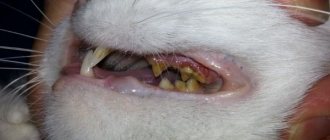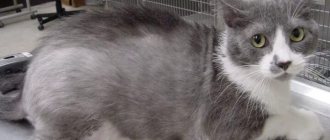Why do domestic cats “talk”?
By making certain sounds, animals want to tell you some information about their desires. One of the main reasons why you hear a cat meowing is because it wants to get its owner's attention. But these are not all the reasons why pets make certain sounds. Sometimes, a cat's meow speaks of her desires, sometimes of worries and fears, and in some cases it can indicate a disease. Therefore, it is important to figure it out in time and understand what the cat’s meow “tells” you.
Night conversations
Probably the most annoying cat ringtone is the cat's night meow. Breeders claim that their nocturnal activity is completely natural. Many pets, not being able to realize their hunting instinct, still try to feel like masters of the territory. They can run around the apartment, play, and, of course, scream loudly and make other “hunting” sounds. Then they prefer to sleep during the day.
And it is precisely at this time that the domestic “hunter” wants her owner to pay more attention to her. At night she is brave and resilient. She really wants to show these qualities to her breadwinner. You can calm a cat's meowing simply by petting your pet or answering it with kind words. Most often, if your cat's meowing is caused by a lack of daytime attention, after you answer her, she will become silent.
Another cause of cat meowing at night is stress. Moving or the appearance of a child in the family, i.e., any changes in the life of an animal, causes stress. When experiencing stress, the pet walks and meows pitifully at night, because then she experiences greater anxiety and an acute lack of attention.
The nightly meowing of a cat in the spring is also a common occurrence. Males attract females with their loud voices, and cats communicate their needs with long meows. Castration or sterilization usually helps to get rid of constant “talks” of this kind.
However, if the above reasons are not present, and your pet still constantly and restlessly turns on his night ringtone, and does not sleep well during the day, this may indicate that he is sick. In this case, the cat's meowing will be strange, it will be sounds such as yapping, wheezing and meowing with an intonation that is not typical for it. In this case, it is best to take your pet to the veterinarian.
Postpartum meowing in cats
After giving birth, a healthy mother will not simply waste her voice on you. After all, all her attention is now focused on the cubs. Therefore, pay special attention to the cat’s constant meowing after giving birth.
If the kittens are with their mother and she is acting restless, she may not be getting enough food or drink. But if the tray with food and water is full, or you just recently fed her, then you should check why she has cause for concern.
A mother's concern is usually about the illness of one of her babies or her own health. Check how the kittens look and feel. How long do they sleep, and does mom get enough rest? If they are okay, pay attention to the mother. The cat's unreasonable meowing and whining, combined with trembling, frequent urination, rapid breathing and other behavior that is unnatural for her, signals to you that the former mother has postpartum complications. Don't guess what to do, she urgently needs to be shown to a veterinarian!
The sounds a cat makes and their meaning
Let's look at how pets "talk" and what it most likely means.
- “Moor-meow” pronounced briefly. If you heard these sounds when you appeared in the apartment, it means your pet greeted you like that. But if you have been sitting at home for a long time, and the animal does not need to greet you, but it still makes such sounds, this means disappointment, because there is no opportunity to get any prey.
- The pet will announce a lack of attention on my part by meowing pitifully and by following me around the house.
- A loud "rattling" sound means your pet is demanding food or other attention. When the animal demands food, it will also make a loud, clear “meow” at the top of its voice.
- A short, single, sometimes quiet, “meow” indicates that the pet cannot contain its emotions. In this way he is similar to people, when something happens in between, we unconsciously say something like “oh my God!”
- The meowing of kittens is usually plaintive, drawn out and loud. With this ringtone, kittens are looking for their mother. This cannot be confused with anything.
- A cat's meow in spring is more like a scream. This is how a cat looks for a sexual partner. The same thing can mean the prolonged meow of a cat in the spring.
- Hissing and snorting indicate that your pet is irritated. And during a fight he will sort of howl. It is better not to approach him at this time.
Sorry, there are no surveys available at this time.
Cat, cat and kittens
Many people find a cat's constant meowing very annoying. Why do cats meow? It is believed that there are more than 30 different sounds that a meowing cat makes, and the number will depend on how often it interacts with other cats and with non-cats, such as people and dogs. Yes, your cat can talk to your dog too!
We humans are accustomed to using vocabulary to communicate with each other, and over the years cats have learned that we respond to vocal sounds much better than we do to body language or smells, which are the main sources of communication between cats.
Why do domestic cats “talk”?
When a domestic cat meows, it is trying to tell us that it wants something, such as “open the doors,” “I'm hungry,” or “hey! Look at me, I want to be tickled!”
Many of the meowing sounds that a cat uses to communicate with humans are variations of the sounds that a kitten uses to communicate with its mother. This happens because cats perceive their owner not as a leader (as happens in dogs), but as a mother figure. Cats depend on our food and the comfort we give them, and therefore they act like little kittens around us.
Cats that spend a lot of time interacting with other cats will use other means of communication: body language, scents, and other forms of feline communication. They primarily use their voice during mating and during communication between mother and kitten.
It is important to pay attention to any change in your cat's behavior, including if your cat is meowing very often, as this may be a sign that she is unwell. It is worth consulting with your veterinarian to find out whether your cat's behavior change is related to her poor health.
What sounds does a cat make and what do they mean?
All sounds that a cat makes can be divided into three large groups.
· Rumbling - produced when the mouth is closed.
· Vowel sounds - made when the mouth closes. This is a meow.
· Loud intense sounds - the mouth is wide open and tense.
There are many different sounds within these groups. However, there are well-known sounds that most cat owners know, and in a broad sense their meanings are the same, namely:
· Normal meowing – seeking attention. Used to communicate with owners or kittens (“well, do you still love me a little?”)
· Clattering of teeth - excitement and disappointment. This can often be seen when cats look at birds through a window and are unable to catch them (involves rapid jaw movements).
· Growling – the cat warns others to stay away.
· Squeaking (kittens) - usually used to attract the mother's attention when kittens are hungry or cold.
· Hissing – usually used as a threat to other cats, but can also be a sign of fear.
· The so-called “Cat Concert” - used when searching for a mating partner.
· Purring is a sign of satisfaction and relaxation, but is also used for self-soothing if the cat is in pain.
· Squeal – used as an indicator of pain or distress (“Just try and step on my tail again!”)
· Chirps are friendly sounds often used to greet other cats and their owners.
Why won't my cat stop meowing?
A cat's excessive meowing is often caused by her learning that she can get what she wants through meowing. This can become a habit, and the cat begins to meow more and more often. This can be quite cute, however, if she starts meowing all night or drives you crazy during the day, then it's time to break this bad habit.
The first step should be to completely ignore her meow. Meowing is used by a cat to get what it wants, so don't give it to your cat when she's meowing (like food), but give it to her when she's being quiet. Likewise, give your cat lots of attention and affection when she is silent and ignore her when she meows.
Don't yell or scold your pet when he meows. If this cat behavior persists, then you may need to resort to a spray bottle: spray some water on the cat when it meows (although I personally don't like this method as it can scare some cats). This won't hurt the cats, but they will soon learn that meowing is followed by a shower, and this will stop the excessive meowing. This can be especially helpful for cats that meow all night for attention. Remember to cuddle and play with your cat before bed.
Some owners use the following trick: a cat can stop meowing if you blow on its face. Why don't you try this with your cat next time she meows? Will it work?
If your cat won't stop meowing
As discussed above, when a cat meows, it is not a simple ringtone. This is how the animal asks you for something. But it happens that you have already done everything that she could want, and the cat’s meowing does not stop. There are two diametrically opposed reasons why this happens.
You could have spoiled her. Every time your pet gave a voice, you stroked her or picked her up. And she is accustomed to the fact that this is the only way she can get your affection. In this case, it is better to teach her what to do is bad (for example, splash water on her when she screams). And start petting only after the cat’s meowing stops.
The second reason why a cat can be heard meowing may be hidden in its restless state due to its own ill health. As discussed above, this will be an uncharacteristic meow, combined with other signs of illness. If your animal behaves this way, do not delay going to the veterinary clinic.
Howl
This sound is very different from a demanding or puzzled meow and is more like a yearning, drawn-out moan that indicates anxiety, discomfort, territorial issues or mating needs. Howling is a way of communicating with other cats and can mean “I want to mate” or “Get off my property!” In addition, this happens when the animal becomes physically ill, loses sensitivity, cognitive functions are impaired, or the usual environment changes: for example, another cat appears in the house. Quite often, cats that have been moved to a new place or adopted into a new home howl because they are suffering from lost “hiding places.”
If your cat begins to howl continuously, take the animal to the vet immediately. If it has not yet been sterilized, it is important to resolve the problem as soon as possible. If the house is private, rivals will probably enter your cat’s territory: perhaps stray cats will be caught, neutered and placed in good hands. Make sure your pet has enough toys and attention. To stop the howling, sometimes it’s enough to play with the cat a little longer in the evenings.
Video "Cat's reaction when she sees a bird outside the window"
Cat ringtones are quite varied. And although when cats meow the video is not always successful, in this video you will still hear the cat meowing and see how it behaves when it sees a bird outside the window without being able to catch it.
Was this article helpful?
Thank you for your opinion!
The article was useful. Please share the information with your friends.
Yes (50.00%)
No (50.00%)
X
Please write what is wrong and leave recommendations on the article
Cancel reply
Rate the benefit of the article: Rate the author ( 13 votes, average: 3.69 out of 5)
Discuss the article:
Communicating with body movements
Now let's look at the habits of cats and their meaning. The tail is particularly expressive. If it is raised up, then the animal is friendly. Remember how kittens' tails stand. Of course, upward, because they are just learning about the world, they are interested in everything new. If a cat is scared, its tail is between its paws. Fluffy is a symbol of an aggressive attitude.
Dominant cats have their tails held high, while subordinate cats have their tails lowered. If a pet knocks on the floor with it, then it becomes angry. When the tail moves quickly from side to side, this is a sign of severe aggression. Lightly waving the tip of the tail means the cat is relaxed.











